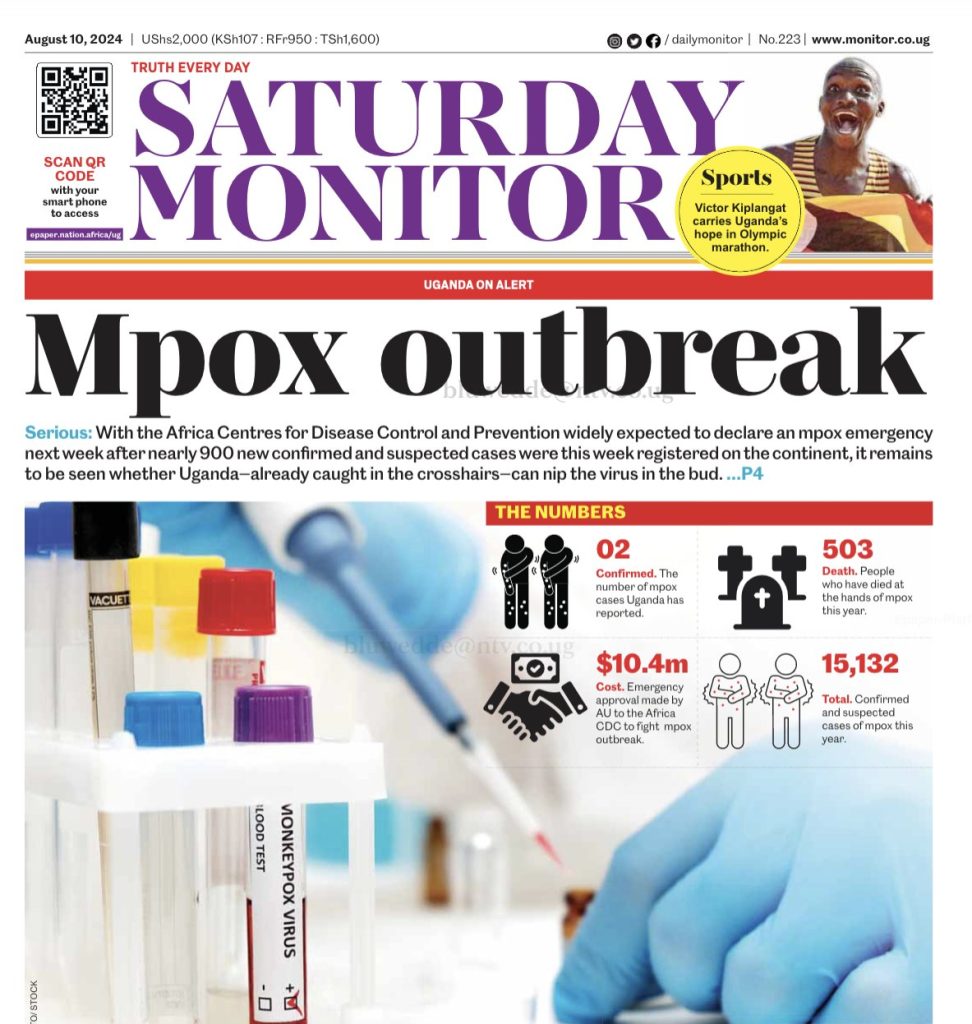As mpox surges, Ugandan advocates send urgent warnings to LGBTQ communities
Colin Stewart is a 45-year journalism veteran living in Southern…
Uganda records 512 new mpox cases in two weeks; total reaches 2,127 cases, 12 deaths
A surge in mpox cases has led Ugandan LGBTQ rights advocacy groups to issue an urgent health advisory to the nation’s queer communities.

The Washington Blade reported:
Ugandan advocacy groups step up fight against mpox
More than 500 new cases reported in country over last two weeks
By Sam Kisika
As mpox cases continue to surge in Uganda, LGBTQ rights organizations have raised concerns over its “troubling increase” among the queer community and have advised it to be on high alert.
The Uganda Key Populations Consortium, an LGBTQ rights organization, working closely with the Health Ministry and Kampala Capital City Authority and other government bodies to stem the spread of mpox, has warned that queer people in semi-urban areas are the most affected.

“These communities have expressed valid concerns regarding stigma and discrimination which may deter individuals from seeking necessary medical attention,” UKPC Director General Richard Lusimbo said.
Uganda has recorded 512 new mpox cases in the last two weeks, bringing the total number of cases to 2,127 and 12 deaths, as the Health Ministry confirmed on Tuesday. The World Health Organization’s latest multi-country report on the mpox outbreak, released on Jan. 11, indicates that Uganda has recorded 1,552 cases and 12 deaths since the disease was first reported last July..
The WHO report places the capital Kampala with the highest number of mpox diseases spread through community transmission with an infection incidence of 45 cases per 100,000 people, followed by the Wakiso and Nakasongola districts.
“Cases have been reported in at least 49 percent (71 out of 146) of districts in the country, but the epidemic remains largely concentrated in and around Kampala,” the WHO report reads. “So far, only clade Ib MPXV, linked to the outbreak in the eastern Democratic Republic of the Congo, has been detected in the country, and current evidence indicates that transmission of the virus is occurring exclusively through close, physical human-to-human contact.”
People between 20-29 are the most affected group, with sexual contact as a major mode of transmission among sex workers and men who have sex with men.
The UKPC has issued an urgent health advisory to the queer community as it collaborates with the Health Ministry and KCCA in responding to the mpox transmission through immediate and long-term actions, including integrating its response with ongoing HIV prevention and care strategies.
Lusimbo, whose organization has also partnered with WHO and the Most At Risk Populations Initiative, a local health NGO, to stem the spread of mpox stated a unified preventive approach that is inclusive and effective is vital for the health and safety of all Ugandans.
“The fear of stigma and discrimination can exacerbate the situation by hindering effective response and treatment efforts,” Lusimbo said.
He noted that the fight against mpox in Uganda is not just limited to managing a health crisis. It also offers the queer community an opportunity to advocate for the rights and dignity of the marginalized groups.
The UKPC last week unveiled an online survey on the mpox epidemic targeting queer people in Uganda to reliably understand its impact on them and their knowledge about the disease.
“Mpox continues to disproportionately affect mostly our community, especially female sex workers and their clients, and men who have sex with men,” the survey reads. “As the national secretariat and coordinating body for key populations, UKPC, in partnership with KCCA, has been leading important discussions on the disease’s public health implications in areas where the impact is most notable.”
The report states the survey data will help develop tailored, inclusive, and equitable interventions for the LGBTQ community. The survey also seeks to provide specific numbers of queer people who have contracted mpox and those who have died from the disease.
Uganda Minority Shelters Consortium Coordinator John Grace attributed the lack of data about queer people affected by mpox to privacy concerns, stigma, and discrimination against the community by the homophobic public and state authorities tasked with enforcing anti-homosexuality laws. He said the Anti-Homosexuality Law has created a significant barrier for queer people to report such abuses.
“This makes it difficult to ascertain the true extent of stigma and discrimination or the impact of misinformation about transmission methods,” Grace said.
Grace also noted the collaboration between LGBTQ organizations and healthcare providers in tackling mpox has been “inconsistent.”
“While some providers have been welcoming and supportive, others demonstrate a lack of awareness or sensitivity regarding the specific needs of the LGBTQ+ community,” he said.
Despite the homophobic climate in Uganda amid the fight against mpox, Grace noted many LGBTQ organizations have proactively disseminated accurate information to educate queer people about the disease’s prevention within their communities through educational campaigns and safer sex practices.




